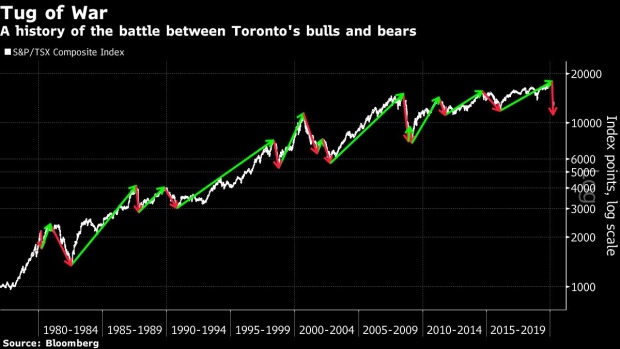Apr 6, 2020
No One Wants to Call Canada’s 21% Stock Surge a Bull Market
, Bloomberg News

(Bloomberg) -- As quickly as the Canadian stock market fell into a bear market, it has even more rapidly surged 21% from its bottom. Yet, few are willing to call the rally by its technical definition -- a bull market.
In 10 trading days, the S&P/TSX Composite Index jumped from its March 23 low to enter the bull zone, its quickest rebound since the index was created in 1977, according to data compiled by Bloomberg. It took 14 days to plunge into a bear market as the Covid-19 pandemic escalated through February and March.
But strategists are calling for caution with the gauge still 4,351 points or 24% away from its Feb. 20 record high. The surge in volatility also implies that investors should continue to expect large daily market moves -- both up and down.
“When you drop so far, so fast, people say it’s not really a bull market until you get back to new highs,” Greg Taylor, chief investment officer at Purpose Investments, said by phone. “I think people would be a lot more comfortable if we were back to new highs but that’s so far away I don’t think we’re at risk of that any time soon.”
More are comfortable with calling this a bear-market rally as they wait for the number of coronavirus cases to plateau with governments across the world focused on flattening the infection curve. And while some countries have signaled that the virus rate is starting to slow, the economic hit from lockdowns and shuttered borders that could last months has been devastating -- Canadian consumer confidence has fallen to a record low as 2.5 million people applied for employment insurance.
A plethora of companies listed on the benchmark gauge have withdrawn their financial forecasts, not just for the first quarter but for the whole year, leaving analysts and investors in the dark on what to expect during the upcoming earnings season as non-essential businesses shut and people stay home to stem the spread of Covid-19.
“A bull market has a connotation to it that there’s a strong trend behind it that it’s going to be a persistent rally,” Brooke Thackray, an analyst at Horizons ETFs Management (Canada) Inc. said by phone. “People are scared to call it a bull market because it just could be a bear trap and not a bull market at all.”
The spat between Saudi Arabia and Russia over oil production and the slump in demand amid the virus outbreak have also taken its toll on the Canadian economy with the energy sector making up about 9% of the nation’s output. Energy stocks represent 13% of the Canadian stock market and they are among the worst performers this year. Tensions may be easing there as crude prices surged primarily due to speculation that the world’s largest producers might reach some sort of truce to the price war.
Read more: Hit by Twin Shocks, Canadian Markets Face Treacherous Recovery
“This will be a big week for the TSX though given our larger exposure to energy stocks and further visibility on OPEC and production cuts via their meeting on Thursday,” said Martin Pelletier, managing director and portfolio manager at TriVest Wealth Counsel in Calgary.
Taylor is keeping an eye on:
- Cboe Volatility Index -- “Getting the VIX below 30 would be a huge step. It’s a huge positive that it’s back below 50 but it still has a lot more to go.” It is about 45 now.
- U.S. 10-year bond yields -- “If we can get them to stabilize potentially get back above 0.75% or 1%, that would be a really nice signal that the markets are starting to work together on the bond side. And that would give a lot more confidence in what the equities are doing.” The T-note yielded 0.67% Monday.
- Stability in banks -- “You can’t have a bull market without the banks starting to go higher.”
- Crude prices -- “As long as oil can eventually get back to above $30, it’s not perfect but it would be a good positive to keep the rest of the market to keep going.” West Texas Intermediate last traded at about $26 per barrel.
No matter what, the road to bull market recovery in Canada will be bumpy as provincial and federal leaders rush to unleash stimulus packages to help ailing sectors and the unemployed and health officials work on slowing the infection rate.
“It’s important to remember that we’re not out of the woods quite yet, but the market appears to be taking an optimistic approach to the coronavirus impact being dealt with in a timely fashion so we hope it isn’t disappointed,” Pelletier said. “This correction has happened so fast and judging by today’s action it has the potential to rebound just as quickly.”
©2020 Bloomberg L.P.


